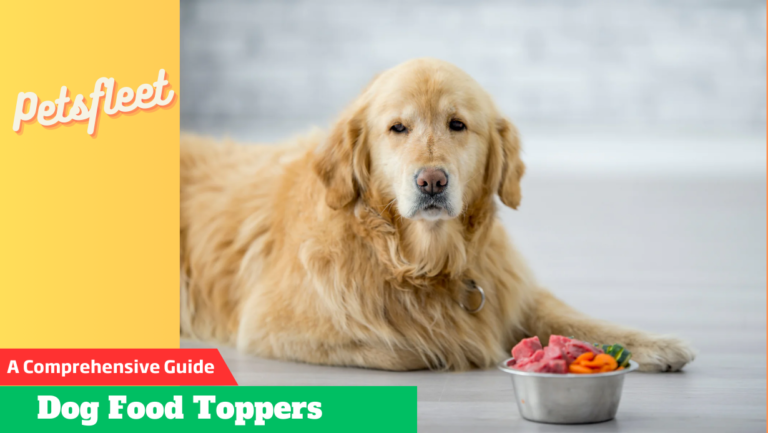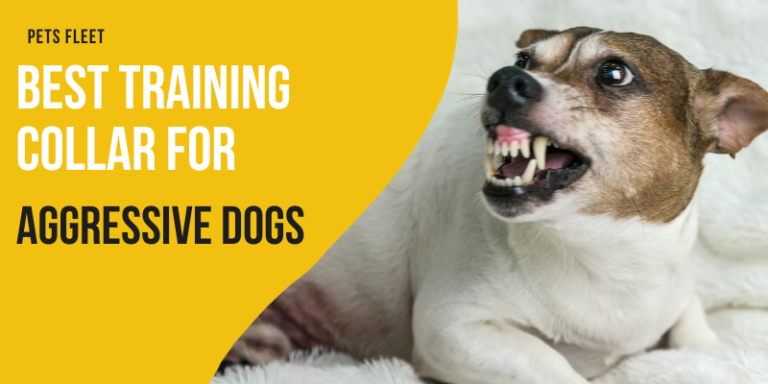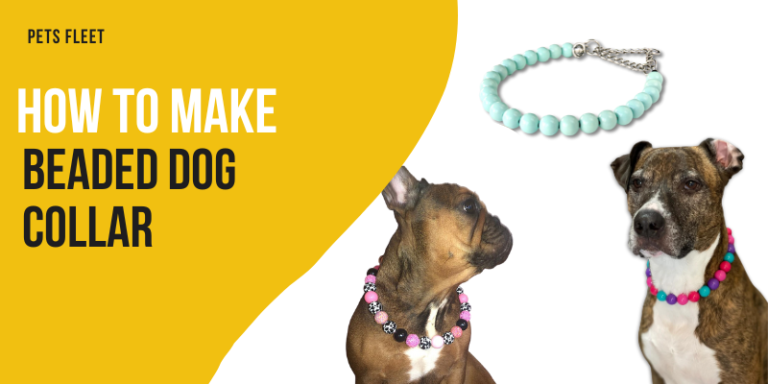The Ultimate Guide to the Best Vegan Dog Food
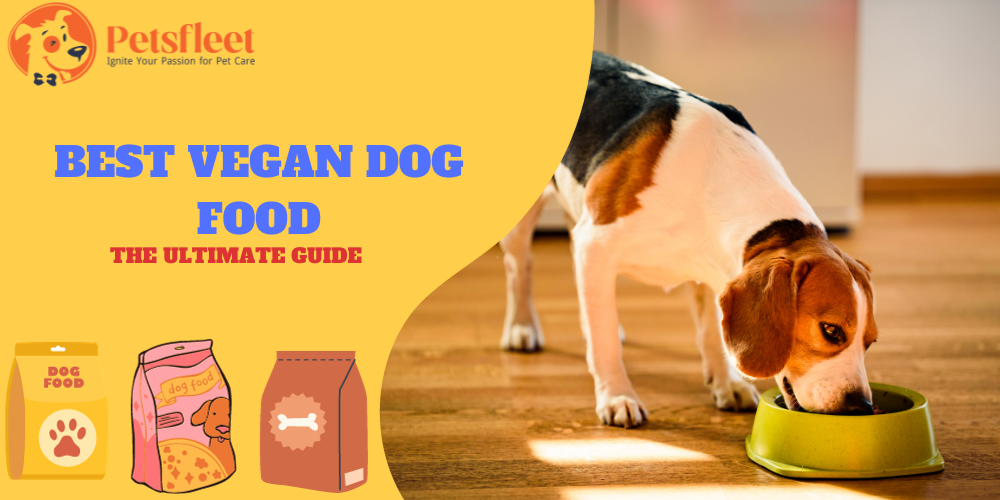
There has been a growing interest in vegan diets in recent years, not only among humans but also among animals. There is a growing trend among pet owners to provide their dogs with nutritious and eco-friendly plant-based diets. Our comprehensive guide will cover the benefits, challenges, and best available options of vegan dog food. Here’s what you need to know if you might want to switch your furry companion to a vegan diet. Read on!
First, let’s try to understand what vegan dog food exactly means.
Understanding the concept of vegan food:
What is a vegan diet for dogs?
A dog food that isn’t based on animal products like dairy, eggs, and meat. Instead, such food completely relies on ingredients that come from plant origin to meet the nutritional needs of your dog. The primary ingredients of vegan food comprise legumes, vegetables, and fruits.
Controversy on vegan food for dogs
In recent years, vegan diets for dogs have been the subject of debate among veterinarians, dog owners, and animal welfare advocates. Dogs are natural carnivores and require vital nutrients from animal-based foods, according to critics. It is claimed, however, that dogs can thrive on a balanced plant-based diet if they follow vegan dog diets carefully.
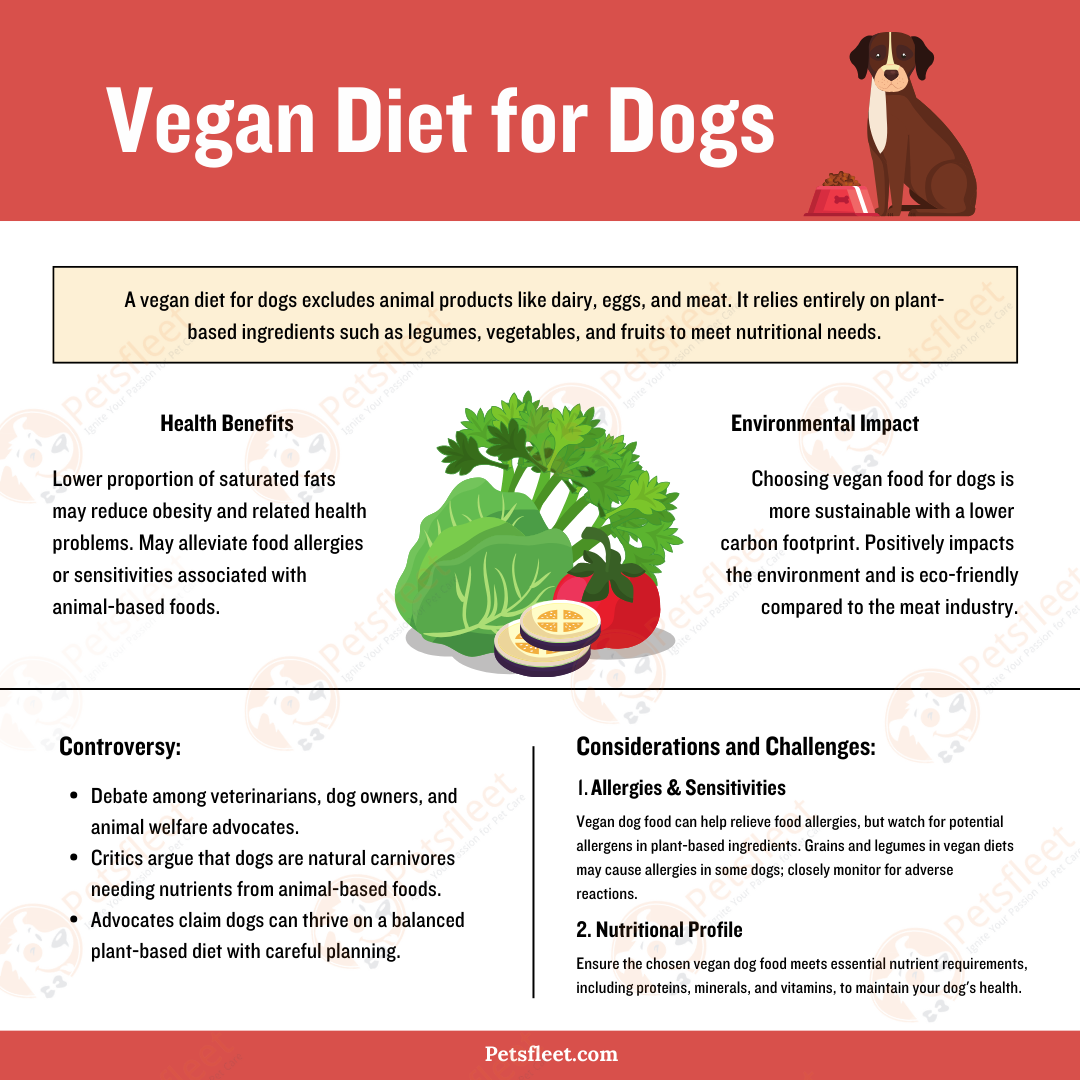
What are the benefits of vegan food for dogs?
Health benefits
The most common reason for dog owners to consider vegan dog food for their furry fellow is its potential health benefits. Vegan dog food is believed to contain a lower proportion of saturated fats, which are the primary source of obesity and related health problems.
Similarly, dogs that have complaints of animal-based food allergies or sensitivities are likely to get relief after switching to vegan dog food.
Environmental impact
Choosing vegan food is a more sustainable option as compared to animal-based diets. The major reason behind this fact is its lower carbon footprint compared to those of the meat industry. Therefore, vegan food has a positive impact on the environment and is an eco-friendly option.
Consideration and Challenges:
Allergies and Sensitivities
Vegan dog foods are helpful in relieving food allergies in dogs; however, don’t forget to consider potential allergens that belong to plant-based ingredients. Several grains and legumes present in a vegan diet might be the source of allergies in certain dogs – closely observe for adverse reactions.
Nutritional profile
Fulfilling the nutritional requirements of your dog must be your top priority, so make careful considerations before choosing the dog’s vegan food. Your dog needs certain essential nutrients, including proteins, minerals, and vitamins, to sustain his life.
Therefore, make sure that the vegan food you are choosing for your doggy must be able to ensure all these essential nutrients to stay healthy.
Make a sound decision to choose the right vegan dog food
You have two options in this regard. Either you can select commercially available the best dog vegan food or try some homemade dog vegan food recipes.
Commercial vegan dog food brands
There are several reputable commercial brands for dog vegan food that are leading the growing market with their variety of options. However, whenever you are going to choose a brand, always select the one meeting the AAFCO standards to ensure the provision of balanced and complete nutrition to your dog.
Homemade dog vegan food recipes
You can try several homemade dog vegan food recipes available online if you prefer to prepare on your own. However, it would be best to first consult a canine nutritionist to ensure a balanced and healthy diet for your best friend for the proper functioning of his body.
Typical ingredients of best vegan dog food
Plant-based proteins
The most common source of proteins in a vegan diet is several ingredients, including lentils, peas, quinoa, and soy. By ensuring these ingredients as a protein source in your dog’s vegan food, you would be confident of providing all the essential amino acids to your dog.
Essential nutrients
The typical formulation of a dog vegan food revolves around the inclusion of all essential nutrients like iron, omega-3 fatty acids, vitamin B12, and many more that are found in products originating from animal sources. Don’t forget to read the label carefully.
Transitioning your dog to a vegan diet
Gradual transition
The best way to avoid digestive upset is to gradually transition your dog to a vegan diet. Over the course of several days or weeks, gradually increase the amount of vegan dog food you are feeding them. The rule of thumb for transition is moderation, so follow it strictly.
Closely monitor your dog
Make sure you closely monitor the health of your dog during and after the transition. If you notice any signs of nutritional deficiencies or allergies in your dog, you should seek medical attention. You should take your dog to the veterinarian on a regular basis to make sure he is in good health.
Vegan treats and snacks for dogs
It is good news for dog lovers who want to switch their dogs to regular vegan food that they also have an option for vegan treats and snacks. These vegan treats can serve as a healthy and tasty reward that is mostly made of ingredients like sweet potatoes, peanut butter, and carrots.
Conclusion
It’s essential to make the decision to switch your dog’s diet carefully and with his or her well-being in mind. In addition to the benefits of vegan diets for dogs, there are also challenges associated with them. Monitor your dog’s health, consult your veterinarian, and choose vegan dog food that meets their nutritional needs.
FAQs
What essential nutrients must be present in vegan dog food?
You need to make sure of the availability of certain essential nutrients while feeding vegan food to your dog, like vitamin B12, vitamin D, proteins, omega-3 fatty acids, and several other minerals.
Can all dogs thrive on a vegan diet?
It is not necessary that all dogs can thrive on a vegan diet, although others may accept it wholeheartedly. It varies among certain breeds and even from individual to individual.
Are there any risks associated with vegan dog food?
The primary health risks that are linked with vegan dog food include plant-based allergies and nutritional deficiencies. Therefore, consult a canine nutritionist to choose the best vegan food.
What should I do if my dog refuses to eat vegan dog food?
It would be best to seek veterinary guidance if your dog refuses to eat vegan food to rule out any underlying health issues. You can get alternative vegan dog food options.


